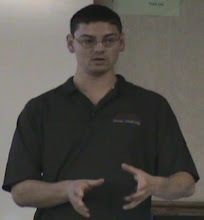 William Halal published a book titled "Technology's Promise: Expert Knowledge on the Transformation of Business and Society" in 2008 [1]. (You can find it here on Amazon.) I had read an early draft of the book in the summer of 2007 prior to a presentation he did at Colorado Technical University's Institute for Advanced Studies.
William Halal published a book titled "Technology's Promise: Expert Knowledge on the Transformation of Business and Society" in 2008 [1]. (You can find it here on Amazon.) I had read an early draft of the book in the summer of 2007 prior to a presentation he did at Colorado Technical University's Institute for Advanced Studies.Quantum computers currently don't exist outside the lab. What we do have in the lab doesn't consist of more than a few handfuls of qubits. This is because physically implementing quantum computers is a very hard task do to decoherence. In other words the system must be isolated from the outside environment. If the qubits interact with the outside environment then it is an observation and the system will "collapse" out of superposition and yield a classical result.
Given the difficulty in implementing quantum computers, there are a wide variety of guesses on when and if they'll become available. I've heard everything from we have them now (D-Wave systems) to we'll never have them.
What William Halal has done is utilize the work of the TechCast project to gather the opinions of 100 experts to come up with best guesses. (These experts are gathered from around the world.) According to this, he lists that "...quantum computers are likely to become available about 2021 +/- 5 years" in "Technology's Promise".
I think the prediction of 2021 is a reasonable one. This still gives us 12 years to overcome the challenges of creating them, which is quite a long time in technology. I wouldn't be too surprised if some hurdles pushed us out a few years, but I also wouldn't be surprised if we made some leaps that also rained the date in a few years. In any case, I expect to see some big advances toward making quantum computing a reality in the next decade or two.
References
[1] W. E. Halal, Technology's Promise: Expert Knowledge on the Transformation of Business and Society, 1 ed. New York, NY: Palgrave Macmillan, 2008.



